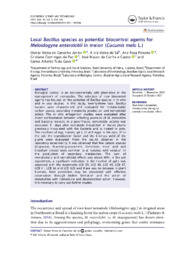Local Bacillus species as potential biocontrol agents for Meloidogyne enterolobii in melon (Cucumis melo L.).
Local Bacillus species as potential biocontrol agents for Meloidogyne enterolobii in melon (Cucumis melo L.).
Author(s): CARVALHO JÚNIOR, O. V. de; SÁ, A. V. de; PEIXOTO, A. R; PAZ, C. D. da; CASTRO, J. M. da C. e; GAVA, C. A. T.
Summary: Biological control is an environmentally safe alternative in the management of nematodes. The selection of new biocontrol agents has focused on the potential of Bacillus species in in vitro and in vivo studies. In this study, twenty-three local Bacillus isolates were characterised and evaluated for metabolisable carbon source, secondary metabolite production and nematicidal action. The in vitro antagonism studies were evaluated after direct confrontation between infecting juveniles of M. enterolobii and bacterial isolates. In a greenhouse, nematicidal activity was evaluated 51 days after nematode inoculation in melon plants previously inoculated with the bacteria and cultivated in pots. The numbers of egg masses, galls, J2 and eggs in the root, J2 in the soil, the reproduction factor and the biomass yield of the plants were evaluated. From the results obtained in the laboratory experiments, it was observed that five carbon sources (D-glucose, N-acetyl-glucosamine, D-maltose, malic acid and trisodium citrate) were common to all isolates, with variation in the production of secondary metabolites. The sum of nematostatic and nematicidal effects was above 90%. In the pot experiment, a significant reduction in the number of galls was observed with the treatments LCB 03, LCB 40, LCB 45, LCB 47, LCB 51, LCB 56 and LCB 5(3) and there was no increase in plant biomass. Root protection may be associated with effective colonisation through biofilm formation and the action of metabolites with nematicide and disorientation action. However, it is necessary to carry out further studies.
Publication year: 2022
Types of publication: Journal article
Unit: Embrapa Semi-arid Region
Keywords: Bacillus, Biocontrole, Biological control, Controle Biológico, Cucumis Melo, Doença, Efeito nematicida, Fungo Para Controle Biológico, Meloidogyne enterolobii, Melons, Melão, Nematicidal properties, Nematóide, Nematóides das galhas, Plant growth-promoting rhizobacteria, Rizobactérias, Root-knot nematodes
Observation
Some of Embrapa's publications are published as ePub files. To read them, use or download one of the following free software options to your computer or mobile device. Android: Google Play Books; IOS: iBooks; Windows and Linux: Calibre.
Access other publications
Access the Agricultural Research Database (BDPA) to consult Embrapa's full library collection and records.
Visit Embrapa Bookstore to purchase books and other publications sold by Embrapa.

